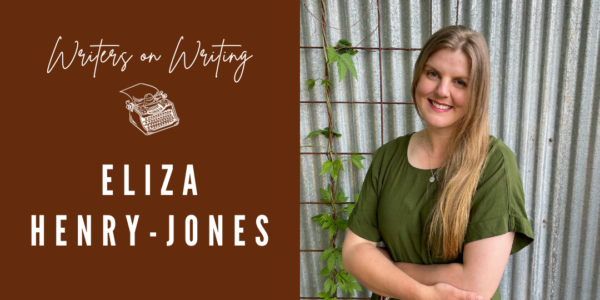
Writers on Writing is our regular conversation with a writer or industry professional about the writing craft, industry insights, and their own practice. This week, we spoke to award-winning writer and academic Eliza Henry-Jones about the process of writing historical fiction, ahead of her workshop Haunted Stories: Writing History into Fiction on 11 November.
Your upcoming workshop will encourage writers to delve into the history that haunts them; can there be a positive kind of haunting?
Haunting is multifaceted – we live haunted lives, and stories are inherently haunted things. Nostalgia is a kind of haunting. Our childhoods, the future we thought we’d have but aren’t living. What we thought the world would be. Being haunted isn’t good or bad – it’s powerful, both within and outside of fiction.
When incorporating historical elements into contemporary fiction, how vital is researching before the bulk of writing begins?
Personally, I like to research enough before I start to feel confident in striking out with the story. This is the only way I can work out what the story’s about. Once I’ve got the bulk of the story pinned down, I’ll undertake more specific research. It’s important to keep in mind that each writing project is unique, and writers all have their own way of doing things.
You draw on historical events, people and ideas to inform your writing. Is your approach to this similar when researching a book like In the Quiet where you delve into grief and trauma, compared to your research into historical events like the Scottish witch trials in Salt and Skin?
In the Quiet was very much a product of the work I was doing, and the study I had already done in psychology and grief and trauma counselling. I don’t think I did any additional research for it – it was knowledge I already had. Salt and Skin was a huge undertaking. Historical research, and writing a place so entirely out of my comfort zone, felt very different and much more intimidating. I read hundreds of books and journal articles, and this helped me with accuracy, but it also helped me work out what I wanted to say.
Can thoroughly researching a place with historical significance match visiting it in person?
It depends on the story being told and the writer undertaking the project – Diana Gabaldon famously wrote Outlander without ever having visited Scotland, and this was decades ago! The resources available to us now are astonishing. Social media, Google maps, live streams alongside an increasingly diverse range of archival material and primary source material available digitally is a gift for anyone researching unfamiliar places. Still, I feel like I need to experience a place in order to do it justice in fiction, but perhaps I’ll surprise myself one day.
Does the writer have a responsibility to accurately portray history in fiction?
That’s such a big question! There’s always a distinction between what is true and what is real – sometimes historical fiction needs to diverge from what is known (or suspected) to create something that feels true, that breathes and communicates something vital. It’s similar to how I feel about the process of writing about trauma or climate change – sometimes we need to diverge from the known details of reality to do justice to the truth of the story, And when you delve into historical accounts of one event or person – really delve into them – you’ll often find wildly disparate details and conclusions. I think that historical fiction and historical texts have a much larger overlap than you’d expect.
Eliza Henry-Jones is an author and freelance writer. She has a PhD in creative writing, and has published five novels, which have been shortlisted for the NSW Premier’s Literary Awards, QLD Literary Awards and Readings Prize for New Australian Fiction. She has qualifications in psychology as well as grief, loss and trauma counselling, and has worked as a therapist, researcher, reporter, and a creative writing tutor at universities. Her latest novel, Salt and Skin, was published in ANZ with Ultimo Press and across the UK and US with September Publishing. She lives on a little flower farm on Wurundjeri land with her husband and young son.
If you want to be the first to read great advice, prompts and inspiration from our incredible tutors, subscribe to our weekly e-newsletter Newsbite.
More from Writing NSW
Check out our full range of writing courses in Sydney, our online writing courses and our feedback programs to see how we can help you on your creative writing journey. Find out about our grants and prizes, as well as writing groups across NSW, and sign up to our weekly newsletter for writing events, opportunities and giveaways.
